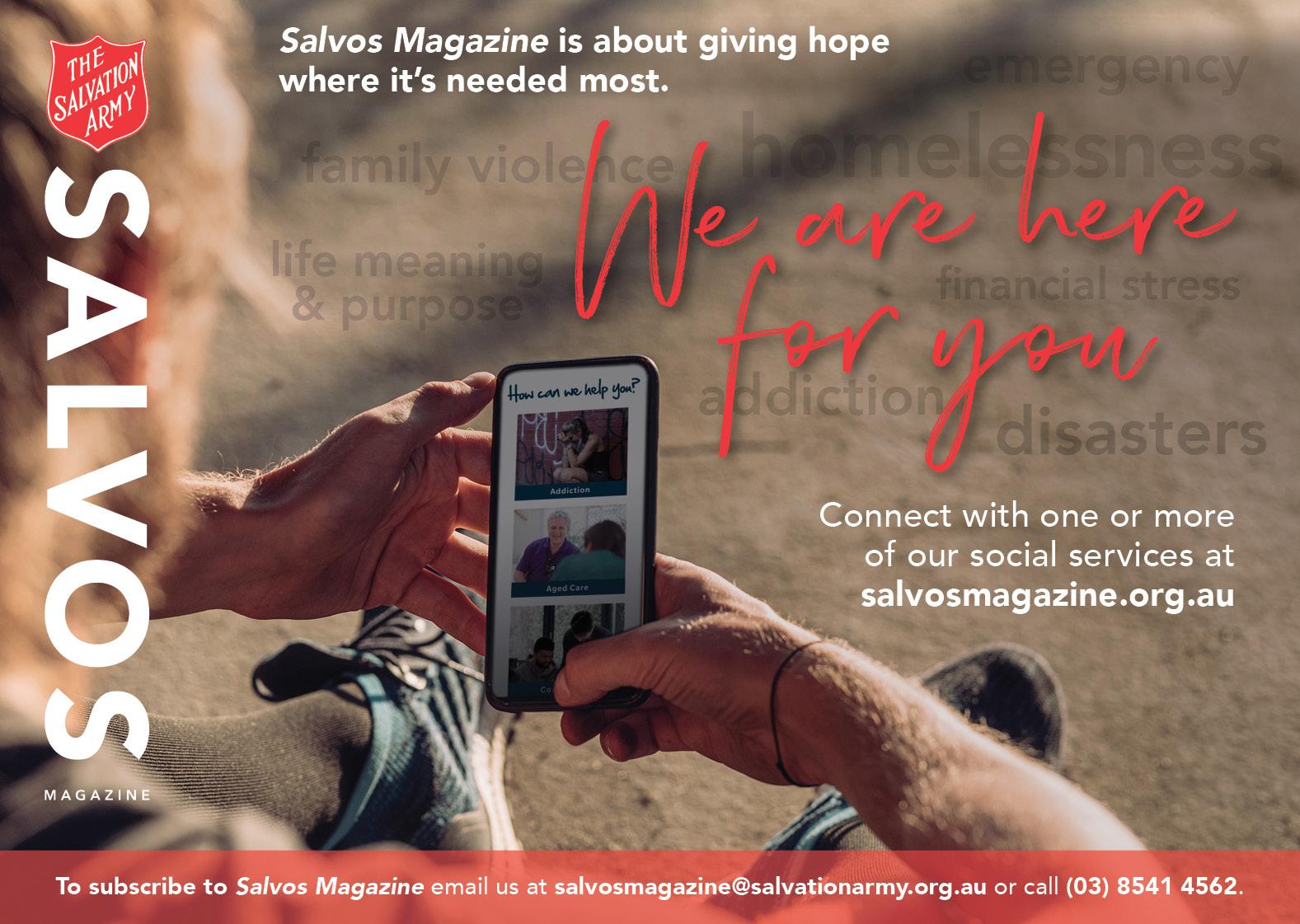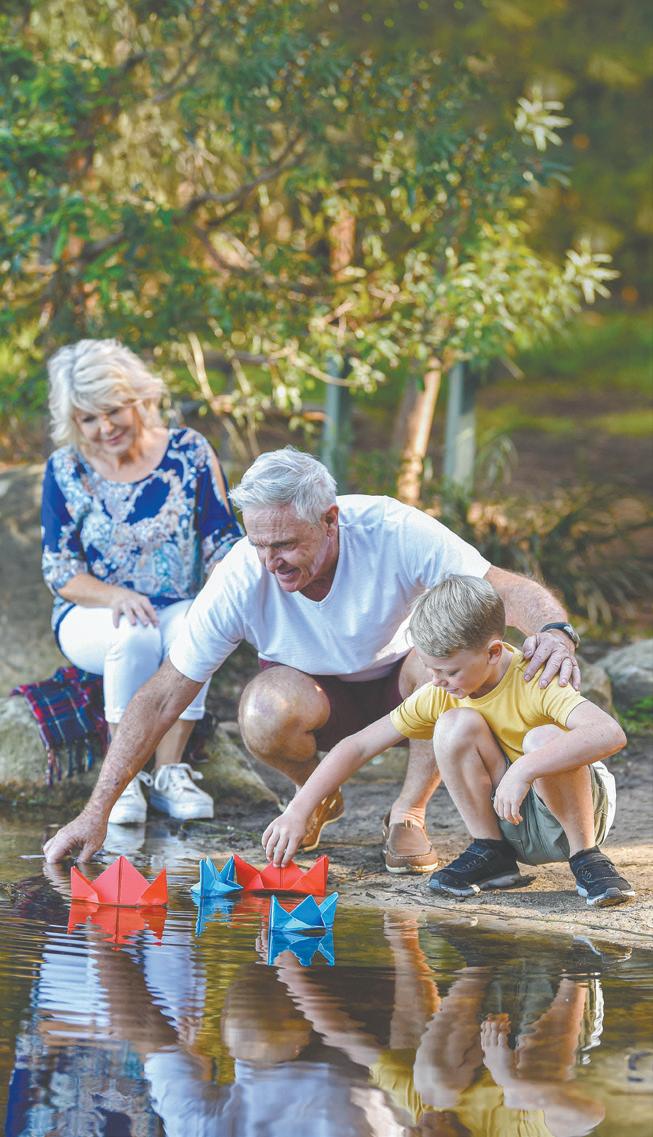Let’s play!




“Play
Albert Einstein
What is The Salvation Army?
The Salvation Army, an international movement, is an evangelical part of the universal Christian Church.
Vision Statement
Wherever there is hardship or injustice, Salvos will live, love and fight alongside others to transform Australia one life at a time with the love of Jesus.
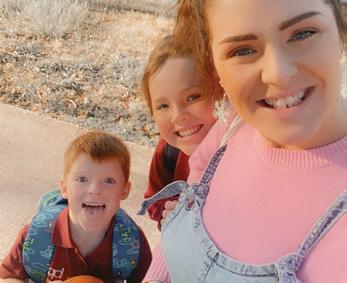
Mission Statement
The Salvation Army is a Christian movement dedicated to sharing the love of Jesus by:


• Caring for people
• Creating faith pathways
• Building healthy communities
• Working for justice
Founders William and Catherine Booth
General Brian Peddle
Territorial Leaders
Commissioners Janine and Robert Donaldson

Secretary for Communications and Editor-In-Chief
Lieut-Colonel Neil Venables
Publications Manager Cheryl Tinker
Assistant Editor Faye Michelson
Graphic Designer Ryan Harrison
Editorial phone (03) 8878 4500
Enquiry email salvosmagazine@salvationarmy.org.au
All other Salvation Army enquiries 13 72 58
Press date 10 October 2022
Printed and published for The Salvation Army by Commissioner Robert Donaldson at Focus Print Group, South Granville, NSW.
The Salvation Army Australia acknowledges the Traditional Owners of the land on which we meet and work and pay our respect to Elders, past, present, and future. We value and include people of all cultures, languages, abilities, sexual orientations, gender identities, gender expressions, and intersex status. We are committed to providing programs that are fully inclusive. We are committed to the safety and well-being of people of all ages, particularly children. salvosmagazine.org.au
Spending time with the young children in my life is a chance to relive those happy years of childhood. I’ve learnt to be engrossed in what they’re doing in that moment, whether it’s pouring water out of a plastic teapot, cutting cookies out of play dough, throwing a ball, or riding scooters (with some reservations) with them down the driveway. Childhood is a short, carefree time in our lives.
Unfortunately, though, that’s not the case for all Australian children. Every year, many thousands have their childhoods impacted by poverty, family violence and poor mental health. We look at the research compiled in The Salvation Army’s Social Justice Stocktake and Impact Report; it’s confronting but there are positive stories, too. Read how the Salvos work with children and parents who have lived through traumatic experiences. And for something to lift your spirits, take on board Jo-anne Brown’s delightful ideas on renewing your zest for life through play.
Faye Michelson Assistant EditorMy Story [12] God never gave up on me
Talk [10] The silent listener
Feature [4] Living in the moment
The Salvation Army is about giving hope where it’s needed most.
Our two cats love playing! Charis likes hiding and unexpectedly pouncing as I walk past, and then chasing me around the house. Sophie loves playing with a frayed length of macrame cord that I throw to her – leaping, pouncing, attack ing and chewing.

As I watch her bouncing exuberantly around the room I know she’s loving these moments of play. I too am filled with delight as I play with her and Charis.
At the end of a full and sometimes stressful day these moments of play help me let go of the things that concern me and the work that still needs to be done. I feel lighter and more joyous, and when I’m focused on sneaking up on Charis (who always knows I’m coming!), I’m free for a short time from all the other responsibilities that absorb me.
GATEWAY OF VITALITY Play has been described by the National Institute for Play as a “gateway of vital ity” – engaging in an activity without any real purpose other than to enjoy the moment with the child, pet or friend you are with, or alone in the outdoors.
Play has been described by the National Institute for Play as a ‘gateway of vitality’.
Animals never really grow out of their ability to play, whereas we may reach a point where we think we are too grown-up for that! We can learn a great deal about play from small children, dogs and other animals, and maybe also from grandparents who learn to set aside their worries and agendas and choose to play with their grandchildren.
In play we can enjoy what happens when things don’t work out the way we expect, and find endless reasons to laugh, often at ourselves.
When we watch a small child serve high tea for a princess or a wizard, using mud, old containers and a garden tap, we see play releasing a flow of imagina tion and creativity. Any old stick in the
Uninhibited play allows us to revisit the joy of childhood
backyard can become a sword, a baton in a relay race, or a banner of victory.
Play can also remind us of the imper manence of life – a sandcastle full of adventure is suddenly wiped out by a wave, or a treehouse that has been a well-guarded fort transforms instantly to a clubhouse for budding magicians.

Most importantly, play reminds us not to take ourselves too seriously all the time. Life is serious enough, and there are plenty of urgent and difficult things to deal with. Moments of play help us to recognise there is more to life, and when we give ourselves wholeheartedly such moments relax and refresh us in body, mind and spirit.
This is partly because when we give ourselves to play we become fully present in the moment. We are not trying to get anything done, to fix anything, or to focus on either the past or the present. Focusing on the past can cause sadness
or anger; focusing on the future can lead to anxiety or stress. When we play, we are simply being present to the joy of the moment, or to creating something fun out of whatever is at hand.
Anyone can play at any time – although there are circumstances when it may be more difficult or challenging. When we choose to fully engage in some thing that brings us childlike joy, we are playing! Whether it is throwing a ball to a pet, dancing around our loungeroom, engrossing ourselves in a puzzle, or tell ing a wild and crazy story to a toddler, we are playing! Play keeps us active, creative and full of life, so let’s play!
Jo-anne Brown is a Salvation Army officer (pastor) and spiritual director in Queensland.
Scan here for more on finding meaning.
“All children have the right to a standard of living that supports their wellbeing and healthy development.” That’s the theme for Children’s Week, held this year from 22-30 October, based on the United Nations Convention on the Rights of a Child, Article 27.
Unfortunately, according to the five Australian Early Development Census (AEDC) domains, around one in five Australian children are developmentally vulnerable by the time they start school. In 2020 (based on pre-COVID-19 research) almost one in six children up to the age of 15 years (17.7 per cent) were living in material poverty.
Significant numbers of children are also exposed to family and domestic violence, with negative outcomes often experienced by the child, including emotional, social, behavioural and academic difficulties.
Salvation Army family violence programs support more than 5000 women and children escaping family and domestic violence every year. The Salvos work with police, financial counsellors and courts to offer individualised support to women and their children, addressing identified risks while planning a course of action.
Specialist family and domestic violence workers are trauma-informed, child-safe, sensitive and compassionate, working to support women and children to recover from the impacts of family violence.
Coleen, a children’s specialist practitioner, talks about her work with a Salvation Army Victorian family violence program.
“I am responsible for coordinating high-quality, integrated assessment, and responses for parents, mothers, children and young people who are accessing family violence services, facilitating a trauma-informed and therapeutic approach,” she says.
“Recently I had the privilege of working with Sarah* and her three-year-old son Jackson*. Sarah mentioned that Jackson

A carefree childhood with happy memories should be every child’s birthright
We talked about what safety means for children, both emotionally and physically.
was having trouble falling asleep at night, and this was far worse after Jackson’s visits with his father, who was assessed by specialist family violence services as a perpetrator of family violence.
“We talked about what safety means for children, both emotionally and physi cally, and explored what Sarah could do to provide a sense of safety for Jackson when he was with her.
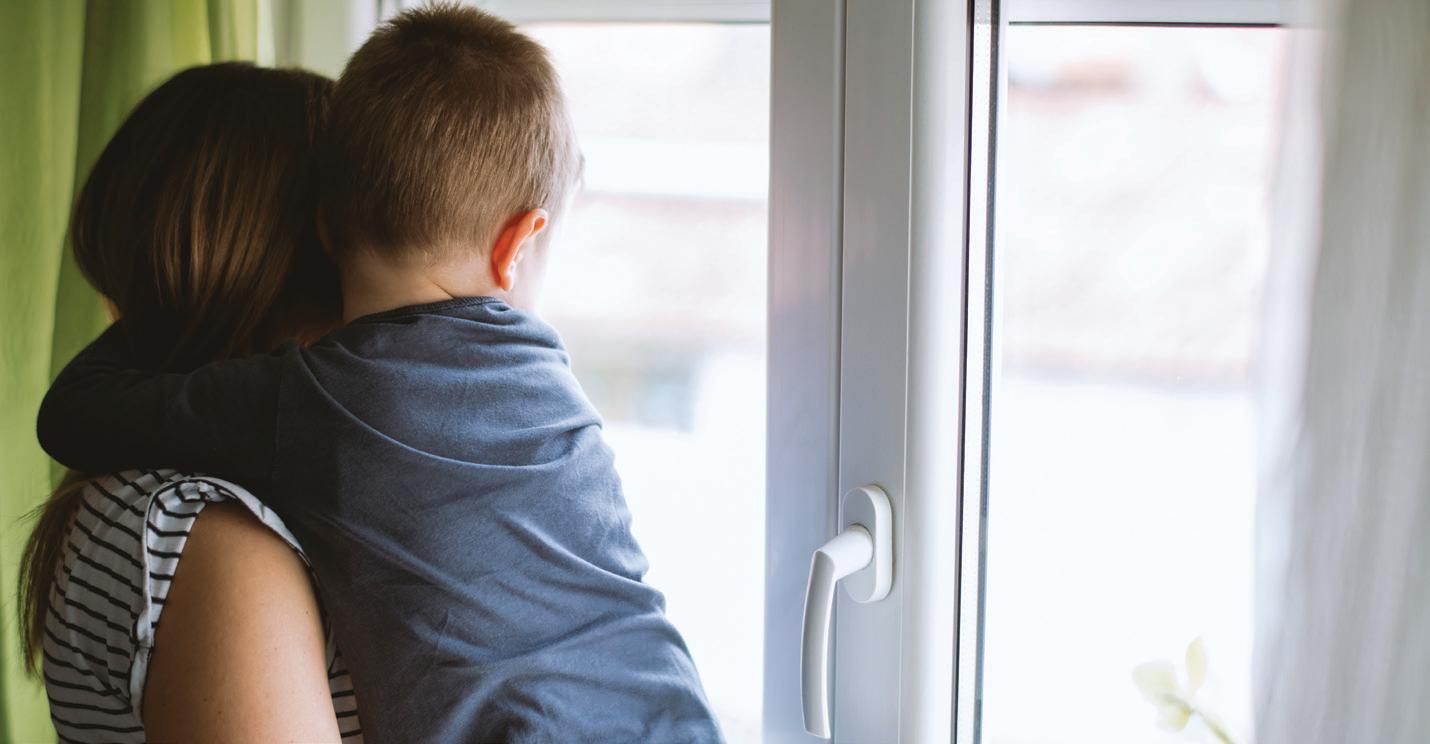
“We began by focusing on what provides safety and stability for infants when their brains are developing, and how family violence impacts this and a child’s ability to relax into sleep. Sarah and I talked about how rocking, swaying, holding them tight, swaddling and playing music are always soothing for stressed infants. What if we could offer Jackson something similar when he returns from visits with his father?
“Together we looked at options for Sarah to consider, thinking about how Jackson might respond. In the end, she agreed to receiving links to meditative music and audio books for her and Jackson.
“Just a short time later Sarah sent a message saying that when Jackson went to bed after returning from a visit with his father, they had played the same music she played for Jackson when he was an infant and to her amazement he settled quickly and went straight to sleep.
“The outcome for Sarah and Jackson was absolutely positive and this expe rience highlights the importance of empowerment and strength-based prac tice to work out a solution, in this case to Jackson’s sleep problem, and improve capacity to cope in stressful situations.”
Read more about The Salvation Army’s programs and services in the 2022 Impact Report at salvationarmy.org. au/about-us/news-and-stories/publications-and-resources/2022-impact-report
Scan here for more information on Domestic and Family VIolence.
Children have a right to a full life and the early years of a child’s life provide the foundation for future health, development and wellbeing. According to the five Australian Early Development Census (AEDC) domains, around one in five Australian children are developmentally vulnerable by the time they start school, and these children are overrepresented in the most disadvantaged settings.
There is a strong correlation between poverty in the first thousand days of a child’s life and adverse health and wellbeing outcomes in later life including poor educational and employment outcomes. Families who attract the attention of child protection services most often have ongoing lived experiences of poverty, domestic and family violence, substance misuse and mental health conditions. Indigenous children are faced with additional hardships and children with disability have nearly four times higher risk of experiencing violence than children without disability.
Children have so much potential. To address this social justice issue we need to provide the foundation for that potential to be realised.

» We can uphold the UN Convention of the Rights of the Child. This will include platforms for children to express their views (voice) equally as adults and freely on all matters affecting them. We can also implement child-centred policies and programs (not just for parents and families), including those that provide early intervention and prevention support for the first five years of a child’s life.

» We can provide funding for programs that provide specialist and safe – including culturally safe – support for children. For example, we can provide child support workers, including for families experiencing family and domestic violence and young parents. We can also better coordinate services used by
In 2020, (based on pre-COVID-19 research), almost one in six children up to the age of 15 years (17.7 per cent) were living in material poverty, not including opportunity or relational poverty.
At 30 June 2018, just over 45,800 children were in out-of-home care in Australia.
Indigenous children are 11 times more likely to be in out-of-home care than nonIndigenous children and approximately 14 per cent of children in out-of-home care were reported as having a disability.
The COVID-19 pandemic has had a profound impact on children and young people. 46 per cent of Australian children and young people are at risk of adverse effects by being physically disconnected from school and youth employment dropped to 67 per cent at August 2021.
children and families (schools, health and community centres), especially in communities that are most disadvantaged.
» We can design and invest in community spaces for children. Soft-entry spaces can provide a ‘hub’ for community connection and targeted support which are more effective in delivering outcomes for disadvantaged children.
» We treat children as fully realised people. We can see the children around us. Smile and be genuinely curious. We can seek out connections with children in spaces that are safe, appealing and welcoming to children.
Pakistan is facing its worst flooding for 60 years, as heavy rainfall continues in some regions.
An estimated 33 million people have been affected by the intense flooding, with a death toll of more than 1500. Eighty of 160 districts have been declared as ‘calamity hit’, according to the National Disaster Management Authority.
The Salvation Army has been working in regions where houses have been completely destroyed by the floods, operating to provide relief and working in close coordination with government agencies to ensure maximum effectiveness. Affected families are being supported with cooked food, hygiene articles and shelter arrangements.
In the Balochistan province, covering the south-western region of the country, 500 families have been supported through the distribution of food packages and hygiene kits.
Approximately 600 families in the Khyber Pakhtunkhwa province, in the north-west, have received relief from Salvation Army personnel. Support in the Sindh province, the south-eastern region of Pakistan, has been focused on the Karachi slums and Dadu areas, where response activity reached 550 families.
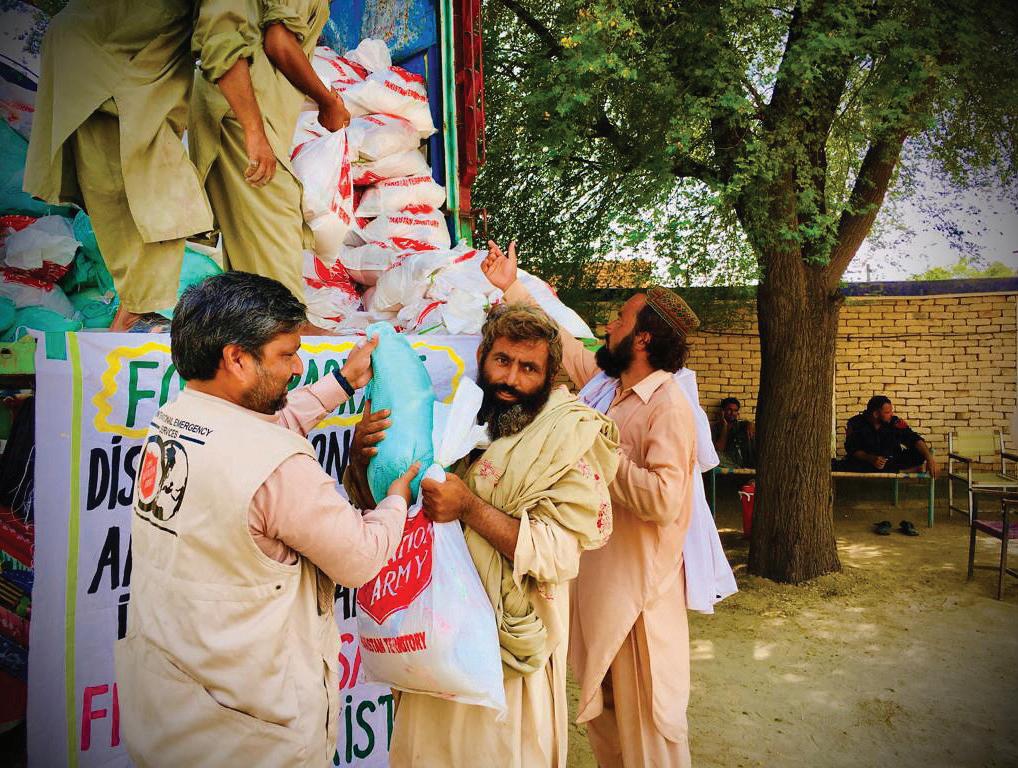
Since the heavy rains started, more than 6000 kilometres of road and 243 bridges have been damaged or destroyed. An increase in the demand for, and a decrease in the supply of, produce and supplies is leading to challenges
in acquiring much-needed relief items. Food insecurity is looming following the loss of 750,000 livestock and additional spoiled agricultural produce.
Previous emergency situations have afforded The Salvation Army the opportunity to implement Disaster Risk Reduction (DRR). Following the Pakistan flooding of 2010, the Salvos sought to reduce the risk of future disasters through the provision of swimming lessons, documentation protection and the construction of stilt houses. It is hoped that once the initial response is complete and recovery is underway further DRR activity will be possible in some of the flood-affected areas.
Salvation Army emergency response teams and volunteers will continue their rapid response in flood-affected areas, carrying out further needs assessments on the ground as they work. The worldwide Salvation Army is praying for the people of Pakistan, and those who are working to provide relief, amid the destruction and devastation they face in these days.
I have a childhood memory of a wall plaque hanging in my grandparents’ house that clearly stated: “Christ is the head of this house, the unseen guest at every meal, the silent listener to every conversation.”

and into adulthood to be measured about how I respond to people and how I treat them, particularly in times of stress or potential confrontation. “If Jesus is listening to this conversation, do I really want to say this or that?”
I suppose it’s why I’ve always been challenged by the Old Testament book of Proverbs, particularly passages about how we react in conversations. Verses like: “A gentle answer turns away wrath, but a harsh word stirs up anger” (Proverbs 15:1), or “The soothing tongue is a tree of life, but a perverse tongue crushes the spirit” (Proverbs 15:4).
I didn’t mind the bit about Christ being in charge or even eating with us, but a silent listener to every conversation ... gulp!
Every time I walked into my grandpar ents’ house, I’d glance at that quote on the wall and make sure I watched what I said – even to my younger brothers –lest I be struck by lightning.
Even now, whenever I see that quote in my mind, I subconsciously sit up straight and strain to recall every conversation I’ve had over the past few days. Funny, isn’t it, how a simple saying can impact you? And the thing was, my grandpar ents were a solid example in adhering to that quote in their everyday lives.
That quote, and my grandparents’ exam ple, taught me throughout my childhood
A person’s words can be life-giving water – words of true wisdom are as refreshing as a bubbling brook (Proverbs 18:4).
I admit that I have failed many times to live up to King Solomon’s words of wisdom. Conversations that have started out okay, especially in a secular work envi ronment, have often degenerated into putting other people down, slipped into the realm of deceitfulness, or descended
into innuendo and slander. It’s not a nice feeling, and I’ve sometimes had to ask for God’s forgiveness later or apologise to someone I’ve perhaps offended.
And it doesn’t even have to be a conver sation. In a culture obsessed with self and social media, it has become easier to fire off a quick response to anything that mildly offends. Bullying, backstab bing and belittling have reached plague
proportions, all from a device in the palm of your hand.

A catchy acronym adopted by Christians worldwide is WWJD (What Would Jesus Do?). The acronym rose to popularity in the 1990s when I was a youth worker with the Salvos. It became a personal motto for followers of Jesus, who used the phrase as a reminder of their beliefs and to act in a manner that would demonstrate the love of Jesus through their actions. Christians often wore a bracelet or wristband emblazoned with WWJD.
What if we all adopted a similar acro nym: WWJH (What Would Jesus Hear?) and incorporated it into our lives?
Wise King Solomon once wrote: “A person’s words can be life-giving water – words of true wisdom are as refreshing as a bubbling brook” (Proverbs 18:4).
Words can either build up, encourage or motivate, or they can hurt, tear down or leave someone with lasting scars.
I don’t have my grandparents’ wall plaque hanging in my house, but I can confidently say that Christ is the head of my household. And as a father of a 20-year-old and a 17-year-old, my hope is that my children hear words of encouragement and support as they go out into the world each day.
If Christ was a silent listener to every conversation you had today, what would he hear?
Scan here for more on finding meaning.
Chantal’s life now is now more than she could have ever asked for
My name is Chantal, and I’m 34 years old. I was born in the Netherlands and moved to Australia when I was 14. I have two wonderful children, Isabella (10) and Alexander (6).
I grew up in a family that had no reli gious background, but when we moved to Australia, I quickly made friends with a girl who was a Christian. I went to Bible studies, church, youth camps and joined a Salvation Army youth group at The Shed in Cranbourne (Melbourne).
But the first couple of years in Australia were very challenging, and I rebelled. When I was about 16, I was kicked out of home, and living with another family. But I didn’t live there long because I got mixed up with the wrong people.
By the time I was 18, I was getting into trouble with the police and had a strong drug addiction. At this time, I met the father of my kids. For the next 10 years, I lived through a terrible situation of domestic violence fuelled by drug use. It broke me.
Just after I turned 30, I ended up in jail with the potential of a very long prison term and the possibility of deportation back to the Netherlands. This was the lowest point of my life. But I knew deep down that I was a good person.
It was in prison that I reconnected with Jesus. Tuesday was Bible study night, and I remember learning about the
parable of the lost sheep. I felt a huge sense of relief. There was hope – God hadn’t given up on me, and if he hadn’t, then I shouldn’t either.
Little by little, I started to change. And I began to pray. The day came when I went to court, and against all odds, the judge sent me to the Salvos Windana Residential Rehab in St Kilda, a minimum 12-month program. I couldn’t believe it!
This moment confirmed to me without a doubt that God had his hand on my life.
On the way down from the courtroom, the guard turned to me and said, “Do you believe in God?”
“Yes!” I replied to her, and she told me, “I asked that because I do, and what I saw in there was incredible – I truly saw God at work in that courtroom.”
This moment confirmed to me without a doubt that God had his hand on my life.
Over the next two years, I worked hard on my recovery at Windana. In June last year, my children came to live with me permanently. When I moved into my
own home, I started connecting more with my community at Berwick Salvation Army and even joined the worship band.




I now work there as an AOD community support worker. Coming from where I was to now being able to use my life experience to help other people get their lives back, it was more than I could have ever asked for.
Scan
God hadn’t given up on me, and if he hadn’t, then I shouldn’t either.
1. Who is known as the boy who never grew up?
2. Which American singer/songwriter wrote the song ‘Forever Young’?
3. Who is the youngest child of Prince William and Princess Catherine?
4. What is the name of the famous Disney nanny who looked after the Banks children?
250 g butter, ¾ cup sugar, 1 egg, 1 tsp vanilla essence, ½ tsp salt, 2½ cups flour, 2 tbsp milk
Method
• Using an electric mixer at medi um-high speed, cream the butter, gradually adding the sugar.
• Beat in the egg, then add the vanilla essence and salt.
• Stir the flour into the butter mix, one-third at a time, until evenly blended. Add milk and mix well.
• Divide the dough into four parts and knead a different coloured food colouring into each one.

• Roll each of the four parts into rectangles of equal size and place one on top of the other. Roll into a tight log, wrap in plastic wrap and place in the fridge for two or three hours.
• Just before you are ready to bake the biscuits preheat oven to 180oC.
• Slice the dough into circles and place them on a baking tray. Bake in oven for approx. seven minutes. Cool and then serve.


5. How old was King Joash, the youngest king in the Bible, when his reign as the king of Judah began?
6. ‘The Boy Who Cried Wolf’ is one of whose fables?
“But Jesus called the children to him and said, ‘Let the little children come to me, and do not hinder them, for the kingdom of God belongs to such as these.’”
Luke chapter 18, verse 16 New International Version
On which page of this week’s Salvos Magazine is Tum-Tum hiding?
What do you call a baby potato? A small fry.

What do you call a boy with an encyclopedia in his pocket Smartie Pants.
Why did the young girl do her school work in a plane? Because she wanted to get higher marks.

Words are hidden vertically, horizontally, diagonally, forwards and backwards. Enjoy! Care Celebrate Children Dreams Education Encourage Fun Future Hopes Included
October Parent Play Protect Rights Safety Special Support Talents Teacher
The only one of Shakespeare’s plays that does not contain the words ‘child’ or ‘children’ is Twelfth Night.
‘Children’ is one of only threewords which are plurals formedby adding the suffix -en. Brethrenand oxen are the other two.
Children’s brains developconnections faster in the first five years than at anyother time in their lives.
Kidzoneadonpage13.
Tum-Tum:ishidingbehindthe
Answers:1.PeterPan2.BobDylan3.Prince Louis4.MaryPoppins5.seven6.Aesop’s
